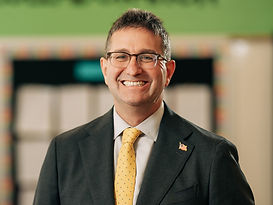GUEST COLUMN.
PROCUREMENT IN STATES AND LOCALITIES: $3.5 TRILLION AND GROWING!
By Terry McKee, director of procurement at Knoxville's Community Development Corporation, the public housing and redevelopment authority for the City of Knoxville

In March of every year the NIGP-the Institute for Public Procurement acknowledges the importance of public procurement and gives recognition to those working in the field. Governors, mayors, superintendents, and other local government leaders also use the month of March to publicly recognize the importance of public procurement and we at Barrett and Greene, Inc. wanted to join in.
With that in mind, Terry McKee has put together the following Guest Column to help readers grasp the enormous – and frequently underestimated – importance of procurement to states and localities.
Public procurement represents a huge portion of our economy – 36% of our gross domestic product. In 2022, states spent $1.7 trillion while local governments spent $1.8 trillion in 2020. Demand for services increases daily and citizens are resistant to tax increases, which means that the pressure on procurement officials continues to mount. Effectively managing the procurement process not only means that the rest of government can deliver goods and services efficiently and effectively, it has a massive impact on budgets.
Imagine what saving 1% of a $3.5 trillion dollars could mean: $35 billion in additional funds available to build roads, schools, prevent fires and provide social services. That’s $5 billion more than the total budget of North Carolina.
Though the tools they can use to foster competition, leverage volumes, know the various markets and more while conducting procurement are similar, there's no single silver bullet that works for all entities equally well. But though government procurement officials conduct their work differently, their success is critical to good governance and affects the daily life of all Americans. Whether driving, flying, attending school, visiting a library, playing in a park, riding a bus, obtaining a building permit, enjoying a zoo, recuperating in a hospital, or calling for a fire truck, public procurement is part of the equation for success.
Procurement professionals make governments’ employees successful by delivering goods and services to perform their work, in an impartial, transparent, and fair manner to maximize taxpayer funds.
Among the goals of professional public procurement:
· Enable every qualified business to have an opportunity to win governmental contracts.
· Promote honesty in government as it negates corruption, favoritism, fraud, and waste by conducting the government’s procurement in an open and transparent manner consistent with the rules and good business sense.
· Create an environment that’s conducive to bringing well-educated, knowledgeable, energetic, and resolute public servants in the procurement roles.
Public procurement is complex and has multiple competing goals that make the profession challenging. Goals include efficiency, effectiveness, local consideration, diversity, environmental awareness, adherence to federal, state, and local rules all the while maintaining impartiality and transparency. Procurement offices are often overworked, understaffed, and underfunded.
So then why would anyone want to take a job in this difficult field in which they are the custodians of trillions of tax dollars? They’re certainly not getting wealthy. And their important contributions are often not acknowledged as widely as are those in health and human services or criminal justice. The answer, I believe, is that many procurement professionals choose to serve their fellow citizens in this way because they sincerely care about their communities and take pride in making their communities better.
Professional procurement is often indicative of a government that functions professionally overall and the way a government conducts procurement is one indicator of its overall characteristics. The people who labor in this field are called upon to avoid a variety of pitfalls. For example, it’s all too easy for procurement officials to rely only on enforcing the rules without adding substantive value to government. To avoid this, procurement officials must continually educate themselves, strive for greatness and look for solutions. Procurement cannot be the department of “no” and must not tolerate the status quo. The world moves rapidly, and procurement must continually evolve and improve.
Leading organizations, private and public, no longer settle for a clerical procurement function but instead incorporate procurement in the organization’s strategic mindset, equip procurement professionals and set expectations high for conduct and performance to best serve their clients and citizens.
Public confidence in government is at a record low with political gridlock, extreme partisanship, and scandals in governments across the nation. Often it seems governments cannot do anything right. Previously revered institutions are no longer held in high esteem. Professional public procurement can help restore trust in government by ensuring quality, fairness, and transparency in the business of government. Procurement helps get the business of government done. Procurement officials make things happen for their entities.
Professional procurement is indicative of a professional government. Good professional public procurement dramatically increases public confidence in government. Public procurement reaches from coast to coast and has a major impact on how well our governments function. Public Procurement is everywhere and it matters!
#State&LocalProcurement #CityProcurement #CountyProcurement #StateProcurement #PublicSectorProcurementManagement #NIGP #InstituteforPublicProcurement #ProfessionalPublicProcurement #ProcurementFairness #StateandLocalContractTransparency #ProcurementTraining #ProcurementRecruitment #ProcurementFairness #ProcurementBusinessOutreach #EthicalProcurement #EthicalPurchasing #EthicalContracting #Procurement&GovernmentTrust #PublicProcurementStaffing #PublicSectorProcurementGoals #ProcurementPitfalls #BusinessofGovernment



































































































